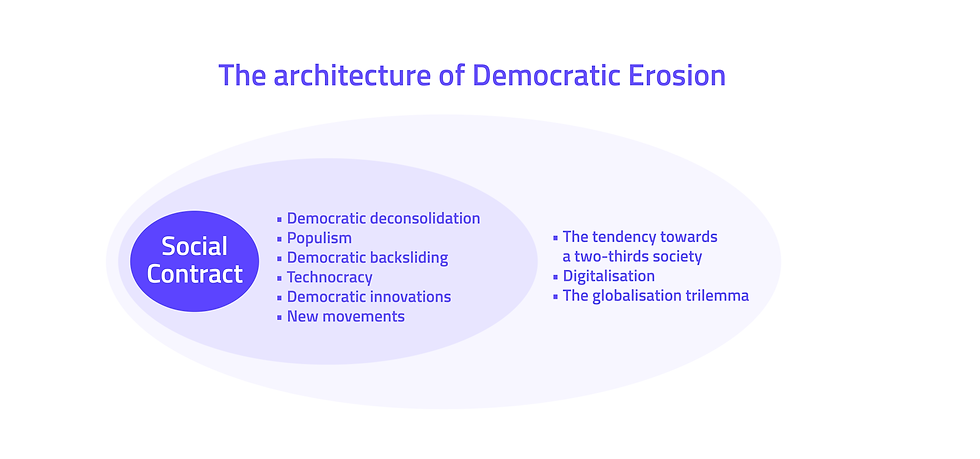This Is Freedom: Obey
- Jun 2, 2025
- 4 min read
Updated: Jul 24, 2025
By: Manuel João Cruz
Democracy embodies the paradoxical notion that individuals are "forced to be free". This inherent tension sits at the heart of contemporary democratic challenges across Europe, becoming particularly visible when confronted by a prevailing logic of simplification, writes Manuel João Cruz, Researcher at The Centre for Social Studies of the University of Coimbra.

Portugal’s recent political landscape offers a stark example: the considerable rise of the far-right party Chega has coincided with a broader trend of declining voter abstention. Although abstention rose slightly to 41.7% in the 2025 elections - up from 40.1% in 2024 - it remains part of an overall downward trajectory in recent years, inviting critical inquiry into how re-engagement and radicalisation may be unfolding in parallel. Is simplification merely an inevitable element of political activity, or has it become essential to political success? Does increased voter participation signal a revitalization of our social agreements, or rather illuminate their underlying fragility?
Politics inevitably requires a degree of simplification and strategic imprecision. Politicians craft streamlined narratives to unify diverse groups and mobilize collective action. As Laclau convincingly argued, without simplification, politics would risk descending into mere administrative management of isolated concerns, unable to tackle broader societal issues. However, when simplification dominates political discourse, it risks obscuring the complex realities it should be addressing, diminishing democratic deliberation, and ultimately reducing citizenship to passive electoral participation rather than informed engagement.
At its core, the social contract illustrates precisely these dynamics. It represents the implicit agreement individuals make to relinquish certain freedoms in exchange for collective security, social justice, and structured liberties. While simplification can effectively communicate political agendas, it distorts perceptions of the nuanced trade-offs at democracy’s foundation. Simplified narratives often mask the complexities necessary to maintain equitable social agreements, creating false expectations of straightforward solutions and fostering disenchantment when simplistic promises inevitably falter.
Populist politics, notably evident in Portugal and elsewhere in Europe, exploit precisely this tension. Socioeconomic anxieties and perceived governance inadequacies push citizens toward populist figures who offer simplified solutions to complex problems. Though populism factually boosts voter turnout and political mobilization, it risks doing so at the cost of eroding essential democratic complexity.
Europe must reconsider the assumption that higher voter participation inherently signals democratic robustness. Democracy’s vitality cannot be captured by turnout figures alone. While the Schumpeterian tradition reduces democracy to a procedural mechanism for selecting leaders - a method stripped of normative aspirations - this view risks obscuring the quality, inclusivity, and deliberative richness of democratic life. Participation matters, but only insofar as it fosters a public sphere capable of grappling with complexity and disagreement without collapsing into antagonism or technocratic detachment. While participation is indispensable, truly democratic discourse must allow space for complexity to address genuine social grievances effectively. A balanced democracy is neither oversimplified nor excessively opaque; it requires a nuanced engagement that simplification threatens to compromise.
This tension revives a crucial paradox within democracy and the social contract itself. If the social contract implies individuals are forced to be free how can dissent against collective democratic decisions be authentically validated? How can genuine democratic processes be differentiated from mere political disagreement? We comply under collective agreement's inherent compulsion, making it essential not to dismiss legitimate dissent as pathology. Returning to Rousseau and the metaphor of the body politic, the question arises: when one part of the body begins to rot who holds the authority and responsibility to intervene? The collective body, commanded by its governing logic, must maintain cohesion and health. Yet, what exactly are the rules governing this intervention? Democracy forces compliance to freedom, but the terms of this compliance require constant renegotiation. If democracy, burdened by ever-expanding responsibilities, risks collapsing under its own weight, perhaps it is time not merely to demand more from democracy but to critically reassess its foundational assumptions.
Ultimately, this reflection prompts a provocative interrogation: Are the limits of democracy inherently tied to the limits of our social contract? Could perceived democratic inadequacies reflect deeper contradictions within the social agreements underpinning contemporary pluralistic (and, by extension, often polarized) societies? If this is the case, democracy and the social contract itself might need to be fundamentally reassessed and possibly reforged under new assumptions, identities, and expectations to effectively navigate the complexities of modern political and social life.
Returning to Rousseau’s critical distinction between possession and ownership, we must question: Are we genuinely the owners of ourselves, actively and autonomously engaged in shaping the democratic structures we inhabit, or have we merely become possessions - objects governed by institutional imperatives, expected to obey, and ultimately determined by the current regime? This question challenges us to critically reflect upon the extent of our freedom, autonomy, and responsibility within contemporary democratic frameworks, pushing us towards deeper inquiries about the authenticity of democratic agency itself.
Hence, the significance and relevance of the CO3 project, which seeks precisely to explore and rethink resilient social contracts amid societal transformations. In doing so, it invites us to reclaim full ownership of ourselves and our political agency - rather than remaining passive possessions of distorted or increasingly limited to what currently passes for democratic regimes and ideals. It also opens space to confront an emerging contradiction: the way democracy itself is increasingly wielded pejoratively, either as an empty signifier or as a rhetorical tool to enforce conformity under the guise of freedom. After all, we can only be forced to be free under a regime that insists we obey in order to liberate us from the burden it itself created.


